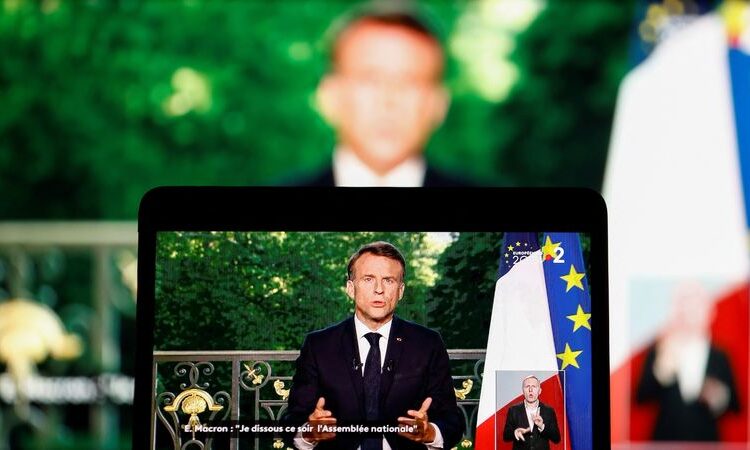
By Yoruk Bahceli and Samuel Indyk
(Reuters) -Gains for the far-right in European Parliament elections that prompted French President Emmanuel Macron to call a shock national vote puts the focus squarely back on political risks in Europe that financial markets had long put on the backburner.
The euro, French stocks and government debt were all hurt on Monday as investors assessed whether the far-right can repeat their success in French elections and how much sway far-right parties can have on the new European Union executive.
“Further economic integration will be slowed down instead of being accelerated,” said Carsten Brzeski, global head of macro at ING, referring to the EU’s rightward shift.
Here are five key questions for markets:
1/ WHAT DOES A SNAP FRENCH ELECTION MEAN FOR MARKETS?
French stocks are the clear losers from Macron’s surprise decision, which came after a bruising loss to Marine Le Pen’s far-right National Rally (RN) in the EU ballot.
Leading lenders BNP Paribas and Societe Generale both fell as much as 8% on Monday.
Barclays’s head of European equity strategy Emmanuel Cau expected banks and utilities to bear the brunt of the uncertainty. Another concern was that populist parties could push for a bank tax which may also be creating unease.
French government bonds could also suffer.
Big investors have already shunned them given a high deficit — S&P just cut France’s credit rating.
The risk is a government less likely to comply with EU rules on keeping deficits in check, Deutsche Bank said, also noting a strong showing for the Socialist party.
The French/German 10-year bond yield gap was 7 basis points wider on Monday at 55 bps, but remains far below the 80 bps reached in 2017 when Le Pen, now less eurosceptic, vowed to leave the euro.
“We expect some underperformance of French assets and by extension, some underperformance of European assets because it adds to a bit of a European risk premium,” said BlueBay Asset Management’s chief investment officer Mark Dowding.
He has an underweight position on French debt and said France’s spread could widen to over 70 bps if the RN win.
2/ IS EUROPEAN INTEGRATION UNDER THREAT?
During the COVID-19 pandemic the EU took unprecedented steps towards a fiscal union with an 800-billion-euro recovery fund, with France a key player in making that happen. A rightward shift in that country and beyond may weaken the case for more.
The risk premium on bonds issued by Italy, a key beneficiary of the pandemic recovery programme, widened on Monday but remains well contained.
Longer-term, diminished prospects for programmes similar to the recovery fund would imply a higher structural risk premium on the bonds of the bloc’s high debt countries, Citi analysts reckon.
3/ WILL EUROPE’S CLIMATE POLICIES SUFFER?
The Greens were one of the biggest losers of the EU elections.
The shift to the right is unlikely to undo existing climate policies, but could make it harder to pass new ones and add loopholes to weaken laws that are due to be reviewed.
“At the margin you might see a bit of pressure on things like renewables within utilities and some relief for sectors like energy if you believe a more right-wing parliament would relax the agenda on the green transition,” said Barclays’ Cau.
4/ WILL EUROPE GET TOUGHER ON TRADE?
The EU executive, unlikely to change from the current centrist make-up, imposes trade protection measures, not parliament.
But parliament’s rightward shift could have an impact.
The EU is already planning to impose tariffs on Chinese electric vehicles.
“The political move to the right in the European Parliament and the outcome of new parliamentary elections in France will undoubtedly lead to more trade barriers between the EU and China,” said Commerzbank’s chief economist Joerg Kraemer.
Any retaliation would hurt European auto stocks, up 4% this year against a 8.5% rise in the broader market.
They took a hit recently on prospects for higher Chinese tariffs. China could also target dairy products, wine, airplane parts, Kraemer added.
5/ WHAT ABOUT DEFENSE SPENDING?
Since Russia’s invasion of Ukraine, pressure on Europe to raise defense spending has mounted.
While member states are primarily responsible for defense spending, nearly two thirds of respondents polled by Citi recently expect further joint EU funding for selective purposes such as defense. The bloc has also broached the idea of a new 100-billion-euro defense fund.
Any far-right opposition to further fiscal integration could dent those hopes.
There was also uncertainty over what the rise of the far-right in Europe would eventually mean for support for Ukraine, as markets grapple with a flurry of geopolitical risks.
(Reporting by Yoruk Bahceli and Samuel Indyk; Editing by Dhara Ranasinghe and Toby Chopra)






